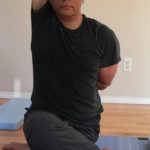I’ve been known to say Self-Care is a full-time job so let it be known…this is my phrase. Why mine? As long as I practice a variety of self-care routines (diet, exercise, energy conservation, herbs, sleep hygiene, etc.), then I have more quality in my life. Not quantity, but quality.
I came to the diagnosis of myotonic dystrophy after many years of digestive distress and more recent intense fatigue. I didn’t have time to de-stress from my 60+ hour work week. I crashed. And burned. I’d get sick at the drop of the hat. Nothing critical but lots of colds, flu-like symptoms.

Leslie with acupuncture needles
Once I had a diagnosis I soldiered on. There was no Western medical treatment protocol. I had experimented with my diet for years — becoming a vegetarian (podcast episode) helped a lot — but not until I started acupuncture treatment (podcast episode link) and a more disciplined practice of yoga (series of podcast episodes) did I start to get a handle on the stress which exacerbated my symptoms.
Somewhere along the way I learned about self-management health behaviors — which has evidence-based research to support but I won’t digress — which we can simplify by calling self-care. That is a term I’m sure you’re aware of or else you wouldn’t have ended up on this website.
According to Wikipedia, Self-Care is “any necessary human regulatory function which is under individual control, deliberate and self-initiated.”
Some place self-care on a continuum with health care providers at the opposite end to self-care.[2] In modern medicine, preventive medicine aligns most closely with self-care.  Self-care is considered a primary form of care for patients with chronic conditions who make many day-to-day decisions, or self-manage, their illness.[5] Self-management is critical and self-management education complements traditional patient education in primary care to support patients to live the best possible quality of life with their chronic condition.[1][5] Self-care is learned, purposeful and continuous.[6]
Self-care is considered a primary form of care for patients with chronic conditions who make many day-to-day decisions, or self-manage, their illness.[5] Self-management is critical and self-management education complements traditional patient education in primary care to support patients to live the best possible quality of life with their chronic condition.[1][5] Self-care is learned, purposeful and continuous.[6]
Self-care can encompass many different practices. In the past two years with my podcast I’ve predominantly explored those practices I’m most familiar with. Now I’m embarking on other practices that work for others with chronic health conditions. Some of these practices I’ll explore as well. You never know what tricks and tips you can pick up from others.
A few years ago I presented at the annual Stanford Neuroscience Meeting on Myotonic Dystrophy about self-care practices. The structure of the talk was similar to Maslow’s Hierarchy of Needs with sleep hygiene being the foundation of my pyramid. Some people handle sleep hygiene like a silver bullet or with a pill. I’ve chosen not to go this route and am quite emphatic about not using any pharmacological care until I desperately need it. Sleep hygiene is a goal I work at throughout the day starting with diet. It’s a combination of what I eat and when I eat. I eat smaller more frequent meals and I stop eating at least 4 hours prior to bedtime.

My nightly self-care ritual includes a hot bath.
My night time ritual generally begins with a relaxing foot massage (podcast episode) by my partner. I’m lucky, I know. The next steps include a warm bath (podcast episode), use of essential oils (podcast episode) for topical application and diffusion, and if I’m feeling anxious about the next day I do a small amount of medical cannabis vaping (podcast episode).
Exercise, or shall I say MOVEMENT, is so vital to our health and well-being. I find that when I exercise during the day, I have a better night’s sleep. So I am conscious about moving every day. That doesn’t mean I actually work-out every day. I try to attend two yoga classes each week, a qigong (podcast episode) class, and a Pilates session (YouTube video). But there are all types of movement practices that people have for self-care. Future podcast episodes will explore these.
While exercising the physical body is important so is exercising our mental and spiritual selves. Now that my career has been shortened, podcasting is a way for me to continue to thrive creatively and intellectually. If you’d like to know more about me, here’s my first podcast episode. Having a chronic illness can put a damper on one’s social life. One way I’ve tackled this challenge is with a monthly book group (podcast episode) which meets at my home. This is really about self-care — having a social network is important but it can gradually diminish. If you’re dealing with health issues at a young age then your peers may be in a different league. Some friends may tire of your canceling an invitation at the last minute. By holding a book group meeting at my house I have more control over my comfort and the food. And I engage in meaningful conversation with like-minded people.
Although I don’t have a daily meditation routine, I practice mindfulness and experience short periods of intentional meditation. Meditation is a self-care practice I am drawn to and I appreciate hearing how others with chronic health conditions have made meditation a priority like British police officer Gareth Walker (podcast episode) and author Toni Bernhard (podcast episode).
I hope you’ll join me on this journey to learn from others about their self-care practices, grab a few more self-care tools for my bottomless tool chest, and enhance the quality of my life.





